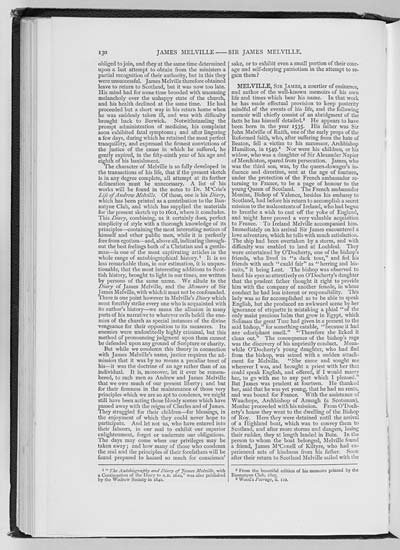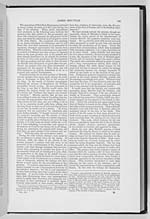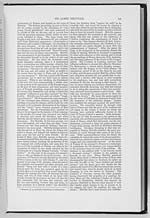130
obliged to join, and they at the same time determined
upon a last attempt to obtain from the ministers a
partial recognition of their authority, but in this they
were unsuccessful. James Melville therefore obtained
leave to return to Scotland, but it was now too late.
His mind had for some time brooded with unceasing
melancholy over the unhappy state of the church,
and his health declined at the same time. He had
proceeded but a short way in his return home when
he was suddenly taken ill, and was with difficulty
brought back to Berwick. Notwithstanding the
prompt administration of medicine, his complaint
soon exhibited fatal symptoms; and after lingering
a few days, during which he retained the most perfect
tranquillity, and expressed the firmest convictions of
the justice of the cause in which he suffered, he
gently expired, in the fifty-ninth year of his age and
eighth of his banishment.
The character of Melville is so fully developed in
the transactions of his life, that if the present sketch
is in any degree complete, all attempt at its further
delineation must be unnecessary. A list of his
works will be found in the notes to Dr. M'Crie's
Life of Andrew Melville. Of these, one is his Diary,
which has been printed as a contribution to the Ban-
natyne Club, and which has supplied the materials
for the present sketch up to 1601, where it concludes.
This Diary, combining, as it certainly does, perfect
simplicity of style with a thorough knowledge of its
principles�containing the most interesting notices of
himself and other public men, while it is perfectly
free from egotism�and, above all, indicating through-
out the best feelings both of a Christian and a gentle-
man�is one of the most captivating articles in the
whole range of autobiographical history.1 It is no
less remarkable than, in our estimation, it is unques-
tionable, that the most interesting additions to Scot-
tish history, brought to light in our times, are written
by persons of the same name. We allude to the
Diary of James Melville, and the Memoirs of Sir
James Melville, with which it must not be confounded.
There is one point however in Melville's Diary which
must forcibly strike every one who is acquainted with
its author's history�we mean the allusion in many
parts of his narrative to whatever evils befell the ene-
mies of the church as special instances of the divine
vengeance for their opposition to its measures. Its
enemies were undoubtedly highly criminal, but this
method of pronouncing judgment upon them cannot
be defended upon any ground of Scripture or charity.
But while we condemn this theory in connection
with James Melville's name, justice requires the ad-
mission that it was by no means a peculiar tenet of
his�it was the doctrine of an age rather than of an
individual. It is, moreover, let it ever be remem-
bered, to such men as Andrew and James Melville
that we owe much of our present liberty; and but
for their firmness in the maintenance of those very
principles which we are so apt to condemn, we might
still have been acting those bloody scenes which have
passed away with the reigns of Charles and of James.
They struggled for their children�for blessings, in
the enjoyment of which they could never hope to
participate. And let not us, who have entered into
their labours, in our zeal to exhibit our superior
enlightenment, forget or underrate our obligations.
The days may come when our privileges may be
taken away; and how many of those who condemn
the zeal and the principles of their forefathers will be
found prepared to hazard so much for conscience'
1 " The Autobiography and Diary of James Melville, with
a Continuation of the Diary to A.D. 1610," was also published
by the Wodrow Society in 1842.
sake, or to exhibit even a small portion of their cour-
age and self-denying patriotism in the attempt to re-
gain them?
MELVILLE, SIR JAMES, a courtier of eminence,
and author of the well-known memoirs of his own
life and times which bear his name. In that work
he has made effectual provision to keep posterity
mindful of the events of his life, and the following
memoir will chiefly consist of an abridgment of the
facts he has himself detailed.2 He appears to have
been born in the year 1535. His father was Sir
John Melville of Raith, one of the early props of the
Reformed faith, who, after suffering from the hate of
Beaton, fell a victim to his successor, Archbishop
Hamilton, in 1549-3 Nor were his children, or his
widow, who was a daughter of Sir Alexander Napier
of Merchiston, spared from persecution. James, who
was the third son, was, by the queen-dowager's in-
fluence and direction, sent at the age of fourteen,
under the protection of the French ambassador re-
turning to France, to be a page of honour to the
young Queen of Scotland. The French ambassador
Monluc, Bishop of Valence, besides his embassy to
Scotland, had before his return to accomplish a secret
mission to the malcontents of Ireland, who had begun
to breathe a wish to cast off the yoke of England,
and might have proved a very valuable acquisition
to France. To Ireland Melville accompanied him.
Immediately on his arrival Sir James encountered a
love adventure, which he tells with much satisfaction.
The ship had been overtaken by a storm, and with
difficulty was enabled to land at Lochfeul. They
were entertained by O'Docherty, one of the bishop's
friends, who lived in "a dark tour," and fed his
friends with such "cauld fair" as "herring and bis-
cuits," it being Lent. The bishop was observed to
bend his eyes so attentively on O'Docherty's daughter
that the prudent father thought it right to provide
him with the company of another female, in whose
conduct he had less interest or responsibility. This
lady was so far accomplished as to be able to speak
English, but she produced an awkward scene by her
ignorance of etiquette in mistaking a phial "of the
only maist precious balm that grew in Egypt, which
Soliman the great Turc had given in a present to the
said bishop," for something eatable, "because it had
ane odoriphant smell." "Therefore she licked it
clean out. The consequence of the bishop's rage
was the discovery of his unpriestly conduct. Mean-
while O'Docherty's young daughter, who had fled
from the bishop, was seized with a sudden attach-
ment for Melville. "She came and sought me
wherever I was, and brought a priest with her that
could speak English, and offered, if I would marry
her, to go with me to any part which I pleased."
But James was prudent at fourteen. He thanked
her, said that he was yet young, that he had no rents,
and was bound for France. With the assistance of
Wauchope, Archbishop of Armagh (a Scotsman),
Monluc proceeded with his mission. From O'Doch-
erty's house they went to the dwelling of the Bishop
of Roy. Here they were detained until the arrival
of a Highland boat, which was to convey them to
Scotland, and after more storms and dangers, losing
their rudder, they at length landed in Bute. In the
person to whom the boat belonged, Melville found
a friend, James M'Conell of Kiltyre, who had ex-
perienced acts of kindness from his father. Soon
after their return to Scotland Melville sailed with the
2 From the beautiful edition of his memoirs printed by the
Bannatyne Club, 1827:
3 Wood's Peerage, ii. 112.

![]() Universal Viewer |
Universal Viewer | ![]() Mirador |
Large image | Transcription
Mirador |
Large image | Transcription
![]()

